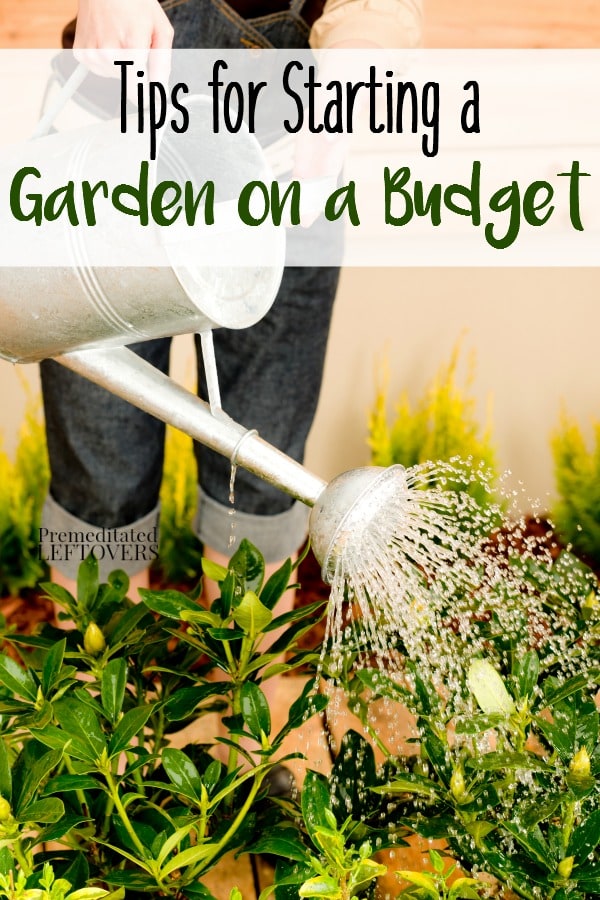
You may have heard that gardening and growing your own food is one way you can save money. If you are really looking to save, but in a financial bind, the idea of starting a garden seems like it might be an expensive endeavor. The good news, it doesn’t have to be. By learning How to Start a Garden on a Budget you can begin growing your own garden without spending a lot of money.
How to Start a Garden on a Budget
Be resourceful. Don’t think you need to buy all new equipment or even things made specifically for gardening. If you are going to need a trellis for instance, look in the free ads. Many times, there are scraps of chicken wire, bed frames, and other “garbage” that can be used in the garden. Don’t have pots? Why not use an old tire?
Be neighborly. Ask if you can borrow a neighbor’s equipment if they have extra trowels, hoes, rakes, or shovels. In exchange, promise them some of your bounty come harvest time. You could even decide to trade share with that neighbor. You grow one kind of vegetable, they grown a different kind, and then you trade your harvest.
Make your own compost to feed your garden. This does not have to be a huge bin in your backyard if you do not have the space. You can compost with just kitchen scraps and worms in a small, sealed container in your kitchen.Not only is this pretty much free (other than the cost of the container), but it will give you great results as it is pesticide-free and organic compost rich in minerals for your plants.
Don’t raise your water bill. Instead, collect the rainwater that will fall this spring in barrels to use to water your garden. You may not get an entire season of gardening out of it, but it will reduce the costs.
Plant what you already buy. Some plants, such as onions, scallions, celery, and some types of lettuce regrow by simply replanting the roots. If you are going to buy them from the store anyway, you might as well have them reproduce. You might need to start new roots, though. To do this, just place the item in a glass of water with the roots submerged and wait a couple days. Green onions are ready to plant in just 3-4 days.
Use vinegar to keep weeds away. Spray weeds directly with plain distilled vinegar to act as a weed-killer. Use care on where you spray it, as it can kill some of the plants you are trying to grow as well. To keep cats and many kinds of pests out of your garden, try sticking orange peels near your plants.
Look for other avenues to get seeds for cheap. You can often buy them online for very low cost and you might even have a friend or neighbor that has some saved from last season. Also, there are seed swapping groups online and some local. Look there for gardeners who may be willing to help you get started.
What are some ways you save money when gardening? What kind of advice would you give a first time gardener? I would love to hear your thoughts in the comments!
More Gardening Tips
How to Start Square Foot Gardening


maxine lesline says
Laydown cardboard.. newspapers.. where you want to start a garden.. these attract earthworms and other micro organisms… even tho earthworms, etc. are not very active during cold weather during warm days they will do some beneficial tilling.. and nothing better for healthy gardens than worm castings. The best garden is the started one.. and this start is no charge.
magnoliasouth says
One tip: it needs to be plain cardboard and not coated. For example, a coffee maker box is likely coated with a paper that has photos of the coffee maker, with lists of features and stuff. It needs to be plain brown cardboard.
Haley says
I love your tips, but unfortunately it’s illegal without a permit to collect rain water in Oregon, where I’m from. It’s meant more so towards thousand acre farms but is still enforced on everyone.
Patricia Wilson says
I’m relatively new to your website, but I’ve already gleaned some good tips, especially about gardening. I’ve been crushing eggshells to a fine calcium-rich powder in my food processor, a new food processor, the plastic mixing container of which looks like it’s been sandblasted; nevertheless, it will be worth it to me if it helps my garden grow well. I’ve started my own vegetables and flowers in the past because I have an area where they get natural light, but also overhead shoplights which can be lowered and raised. MY DILEMMA THIS YEAR IS I NEED TO BE AWAY FOR FOUR DAYS AT THE END OF MARCH (20th-23rd) AND THEN AGAIN FOR A FEW DAYS AT THE END OF APRIL (24th-28th). IS THERE ANY RELIABLE WAY TO KEEP MY SEEDLINGS MOIST, BUT NOT DROWNED WHILE I’M AWAY?
Jack @ SeeJackSave says
This is a great article Christine! We use many of the same frugal gardening tactics in our backyard urban “farm”. The other thing to consider is which veggies to grow. We grow peppers, tomatoes, peas, and others that are more expensive in our local market or things that produce all season like spinach rather than veggies like potatoes that are cheap to buy or slow to produce. That way we maximize the production value of every square foot of garden.
Polly says
Great tips! how can a newbie like me find out which veggies produce a lot orall season?
are any veggies Perrenials?
magnoliasouth says
Right, this is how we plan our garden too, however keep in mind that the reason some are more expensive to grow is because they’re more difficult to grow. The greater the expense, the more difficult it is. For beginners, they need to start with the easy cheap ones and then branch out slowly.
One question though for Christine: I’ve never bothered with green onions but if you take your grocer’s green onion, root it and plant it, does it multiply? My understanding is that onions don’t multiply, but I’ve never grown them, so I may have a misunderstanding.